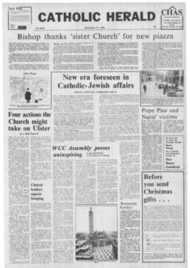Page 4, 12th December 1975
Page 4

Report an error
Noticed an error on this page?If you've noticed an error in this article please click here to report it.
Tags
Share
Related articles
Hopkins' Bible Comes
Quickened By All That Surrounded Him
Abbey Honours Hopkins
Poets' Corner
Our Debt To The Jesuit Poet
Hopkins in Poets' Corner
IF ANYONE had told Gerard Manley Hopkins that his name would one day stand inscribed in the Partheon of English Poetry, and that the Church of England and the Church of Rome would combine to honour his memory in a noble celebration, he would have said that this could happen only after the Resurrection of the Dead — whom, as we shall all agree, there need be no limits to the seemingly impossible.
Writers are received into Poets' Corner either because time has confirmed their title to admission, or because their contemporaries have no doubt as to what time will say. This was the case with T. S. Eliot and W. H. Auden, but the contemporaries of Hopkins were not even aware that he was a poet.
On Monday, when the plaque to Hopkins was unveiled, the Abbey had never looked more beautiful, with the sun striking the high Gothic arches now restored to their original brightness. The candles blazed on the altar beyond the choir where we were seated. Everything proceeded with the smooth perfection and unforced discipline of Anglican C eremonial.
As we sang Newman's "Praise to the Holiest in the Height", the procession entered with Bishop Cowderoy of Southwark and Bishop Trevor Huddleston walking side by side with Bishop Mahon and the Apostolic Delegate not to mention various distinguished member of the Society of Jesus.
It was an image of Christendom united, and when Fr Peter 1 evi, SJ, in an exemplary address, remarked of Westminster Abbey that it enshrined -the contradictions of our history", it seemed, on this morning of Our Lady's 1m
maculate Conception, as if those contradietions had been reconciled by the power of poetry and of prayer.
The Abbey is nothing if not a stage, and Hopkins was allowed to hold it. Sir John Gielgud read "HeavenHaven", "God's Grandeur", and "The Windhaven" with perfect understanding, and the resonance of which he is a master.
Fr Alfred Thomas, Si, to whose organisation the occasion owed so much, read passages from Philippians and Ecclisiasticas. and Sir John came in again with a passage on the Incarnation from one of Hopkins' sermons.
A small procession then left the sanctuary for Poets' Corner. From here the martial tomes of the Duke of Norfolk proclaimed that the memorial tablet had been unveiled. and his invitation to the Dean to dedicate it had the authority of a military command. A wreath was placed upon it by a. member of the poet's family; the procession returned. and Fr Levi entered the pulpit.
He spoke of Hopkins the man and the priest: of his inward liberty and his lose of life, although his own life was restricted. unhappy and apparently unsuccessful.
He spoke of his vision of Christ in the tiniest flower. or in the sun rising over an empty sea. He spoke of his character as a Mail of his time — prejudiced in some ways, eccentric in others and as a man who never lost sight of the "City of Heaven hanging over the London of the future."
Although neither poetry nor prophecy could be confused with prayer, they could .sometimes take its place when prayer had become impoverished. Prayer did not rise easily when neither poetry nor
prophecy were at hand to assist its flight.
' Sir John Gielgud then read four stanzas from "The Wreck of the Deutschland", and the very difficult "That Nature is a Hereditean Eire and of the Comfort of the Resurrection."
The last words of this:"Immortal Diamond" — are
inscribed on Hopkins memorial tablet. As for "the comfort of the resurrection", the analogy was plain to see
between the soul and body resurrected in Christ, and. the
poet whose verses never saw their day in his lifetime now ren4mbered with his peers — Eliot and Adey, Browning, and Masefield — under the eye of Geoffrey Chaucer, whom Fr Levi had described as "the godfather of the tribe".
Sir John Betjeman, the Poet Laureate, and 'Kathleen Raine were among the living poets in that invited congregation.
Yet there was one absentee whom we sadly missed. No one
has done more to extend _the fame of Gerard Hopkins, both in Britain and America, than Fr
D'Arcy. Only a few months ago he was preaching on "The Wreck of the Deutschland" at Farm Street. Yet he felt himself too frail to face the ceremony. After we had been entertained in the Jerusalem Chamber
returned to Poets' Corner for a leisurely inspection of the tablet. Beside me was an American Jesuit who knows more about Hopkins than any man alive.
I expressed by regret that Fr D'Arcy had not been with us.
"Never mind," he said. "I have a tape recorder." I should like to have been in Fr D'Arcy's
room later that afternoon; Heaven forbid that he should leave us, but I fancy that he would have been prepared to sing his Nunc Dendttis.
Robert Speeight
blog comments powered by Disqus









